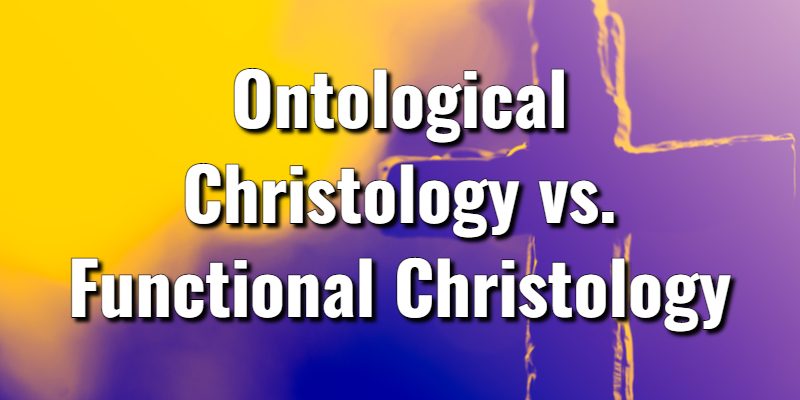As we begin this study comparing Ontological vs. Functional Christology, it’s important to discuss what Christology refers to in a general sense. Translated literally from its Greek counterpart Χριστόςλογία, Christology simply means “the study of Christ.” Today, it’s used to define a branch of theology focused entirely on Jesus. Christology aims to answer questions about whether Jesus was human or divine (or both), His role as the Messiah, the salvation He offers, and so much more. Christology was important in the early church as they practiced apologetics against the many false doctrines of the times. Throughout Christian history, Christology has helped to cement a firm foundation of mainstream Christian belief about who exactly Jesus was, what He did, and what it means for humanity. Given the different Christian denominations, Christology helps to delineate key positions held by past and current churches. The different Bible versions also play a role in Christology given that they were translated using different manuscripts, methods, and textual traditions.
Ontological Christology vs. Functional Christology
What is Ontological Christology? Ontological Christology Definition
Merriam-Webster defines ontological as “relating to or based upon being or existence.” So then, Ontological Christology aims to delve into who Jesus is. For instance, the Bible contains many names for Jesus, such as “Son of God,” “Lamb of God,” and “Messiah.” When one learns the meaning behind each name and what they teach us about who Jesus was, they are studying Christology.
For another example, studies in Ontological Christology tell one that Jesus was both fully human and fully divine. But why must that be so? The Bible clearly reads that Jesus is God manifest in the flesh (See John 1:1, John 10:30, John 8:58, Colossians 2:9, and Hebrews 1:3). From this knowledge, one can deduce that if Jesus is God Himself, He must be fully divine.
Yet, if Jesus was fully divine and nothing else, what would His sacrifice on the cross really mean? If God was going to take on flesh to pay the punishment for the sins of the world and face death itself, He must be fully human to do so or the impact would not be as meaningful. So, Jesus must also be fully human in order to live a perfect human life yet take on the sins of everyone else, in turn breaking the hold of sin and death over humanity forever.
Ontological Christology serves to analyze the nature of Jesus through discourse such as this. Ontological Christology is crucial to theology as a whole because the entire faith rests on the identity of Jesus.
Ontological Christology Defined
What is the Functional Christology? Functional Christology Definition
Functional Christology focuses on the works of Jesus. When studying Functional Christology, one aims to understand Jesus by what we see Him do and how that relates to His overall purpose, according to the Scriptures. Functional Christology asks questions about how Jesus lived His life, how He taught, and how He served others in ministry, including His miracles and healings.
The Gospels are filled with many stories of all the things Jesus did. The Synoptic Gospels actually speak much more to Jesus’ actions than to His identity. Later in the New Testament, the epistles go into further discussion of Jesus’ identity, but this is not how Matthew, Mark, and Luke approach Christology.
For instance, when Jesus arrives on the scene in the Gospels, He goes about things much differently than everyone else. He doesn’t follow the elitist ways of the Pharisees, the separatist ways of the Essenes, or strive after social status like the Sadducees. Jesus teaches, acts, and performs miracles with a power and authority unlike anyone had seen before. Functional Christology digs into these accounts, peeling back the layers of meaning and what it all teaches us about Christ’s action.
Functional Christology Defined
Ontological Christology vs. Functional Christology; What’s the Difference?

While Ontological Christology speaks to who Jesus is, Functional Christology expresses what Jesus did. Both of these are important and co-exist with one another. Actually, we see them co-exist quite well in the Bible. Both of these approaches are taken throughout the New Testament and together help us understand Christ’s deity and foundational place in Scripture.
While these two focuses of Christology go hand-in-hand, it’s still helpful to have them separated into their own disciplines. Why? Because throughout the Scriptures, both the Old and New Testament, the Messiah is discussed with both of these different focuses. Studying them separately helps us to unravel what each of them means without overshadowing the other.
For instance, sometimes we can focus so much on Jesus’ divine nature that we ignore or miss important points relating to the truth that He was fully human as well. In situations like this, Ontological Christology can help one to avoid this pitfall. Or, we can focus so much on Jesus’ miracles that we don’t give His teachings the time and attention they deserve. This is where functional Christology plays a role.
How one understands who Jesus is and what He did is a critical aspect of the Christian faith. Christology is an essential branch of theology and understanding the different areas of Christology and why they’re important can help us to comprehend the nature of Jesus in our own worldview.
NOW READ: The Best Christology Books to Consider
Lord's Library participates in affiliate programs. We may make a small commission from products purchased through this resource.
- What Does the Bible Say About Discernment? With Key Scriptures - July 19, 2024
- What Does the Bible Say About Disobedience? With Key Scriptures - July 19, 2024
- 1 Timothy 1:12 Meaning: Commentary on an Important Scripture - July 11, 2024













